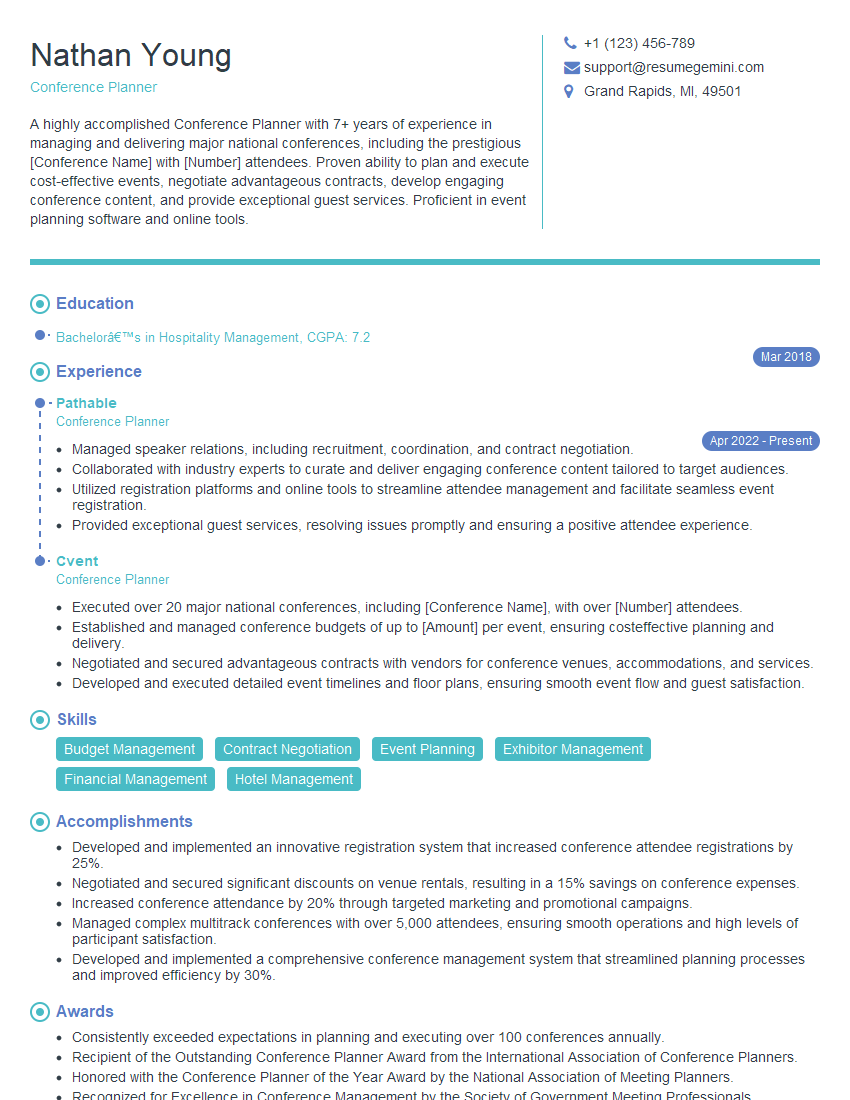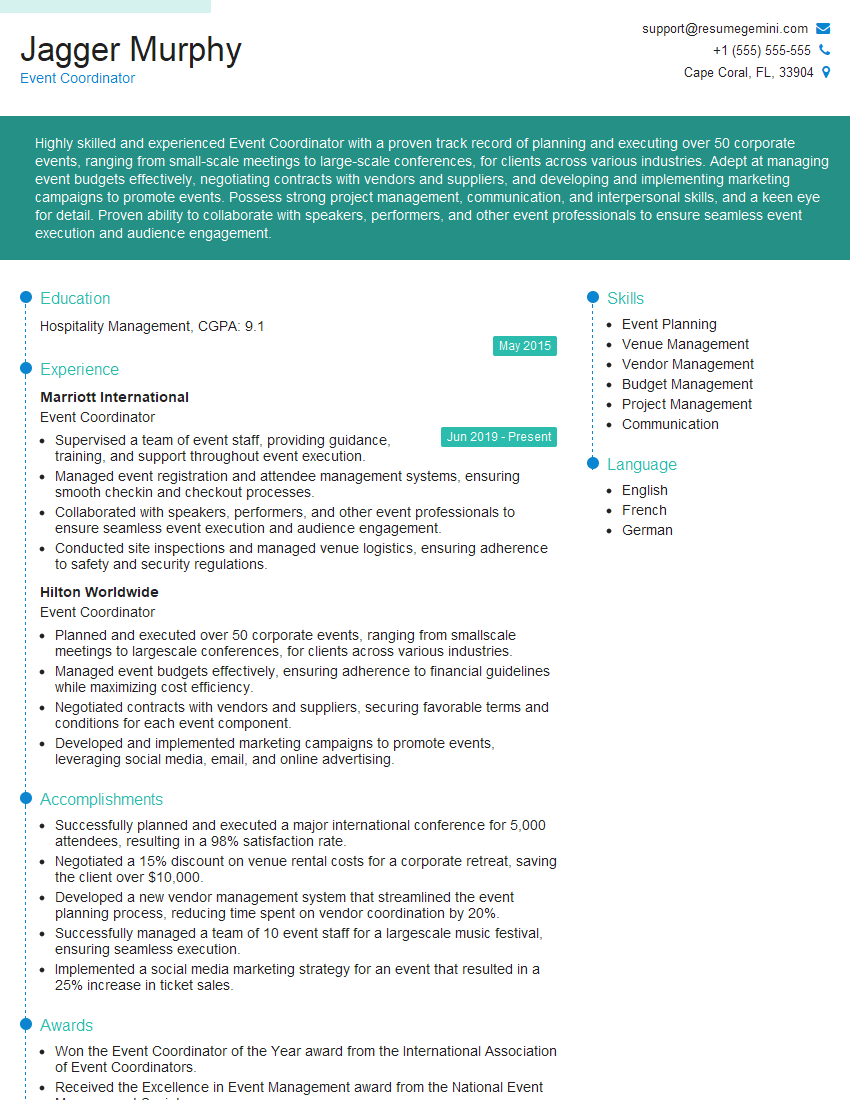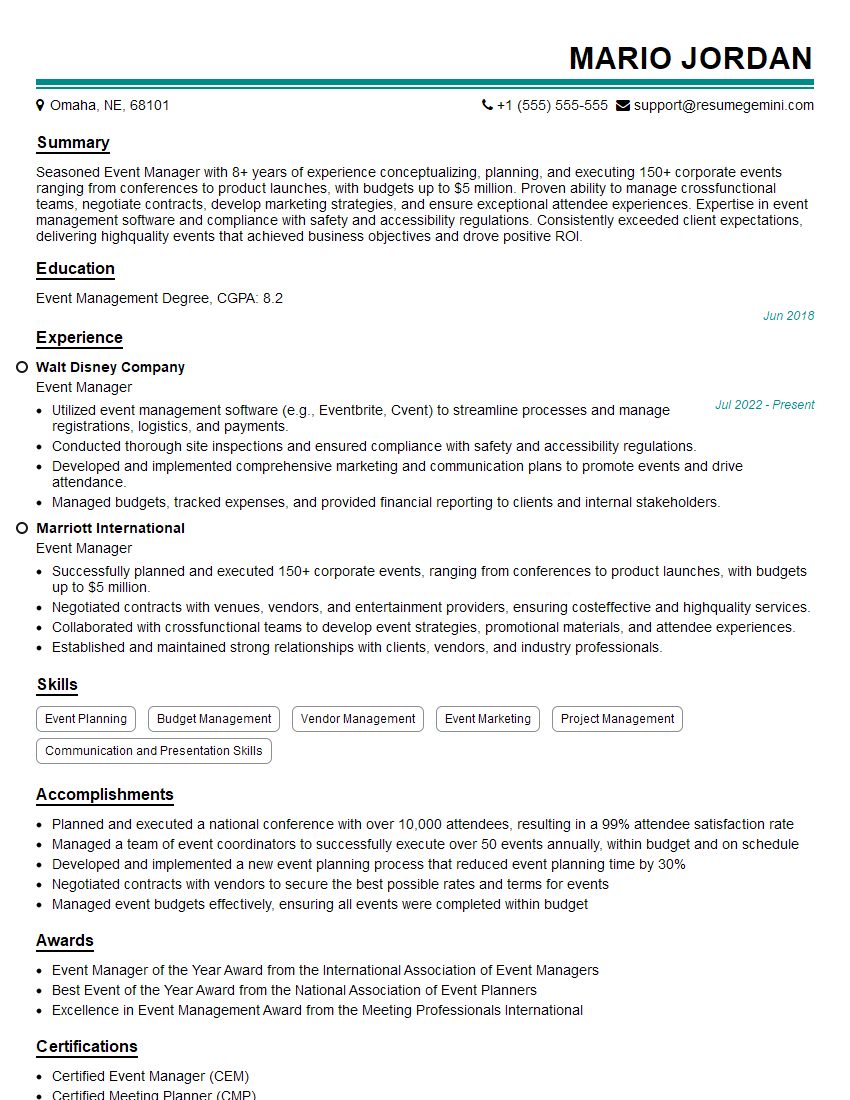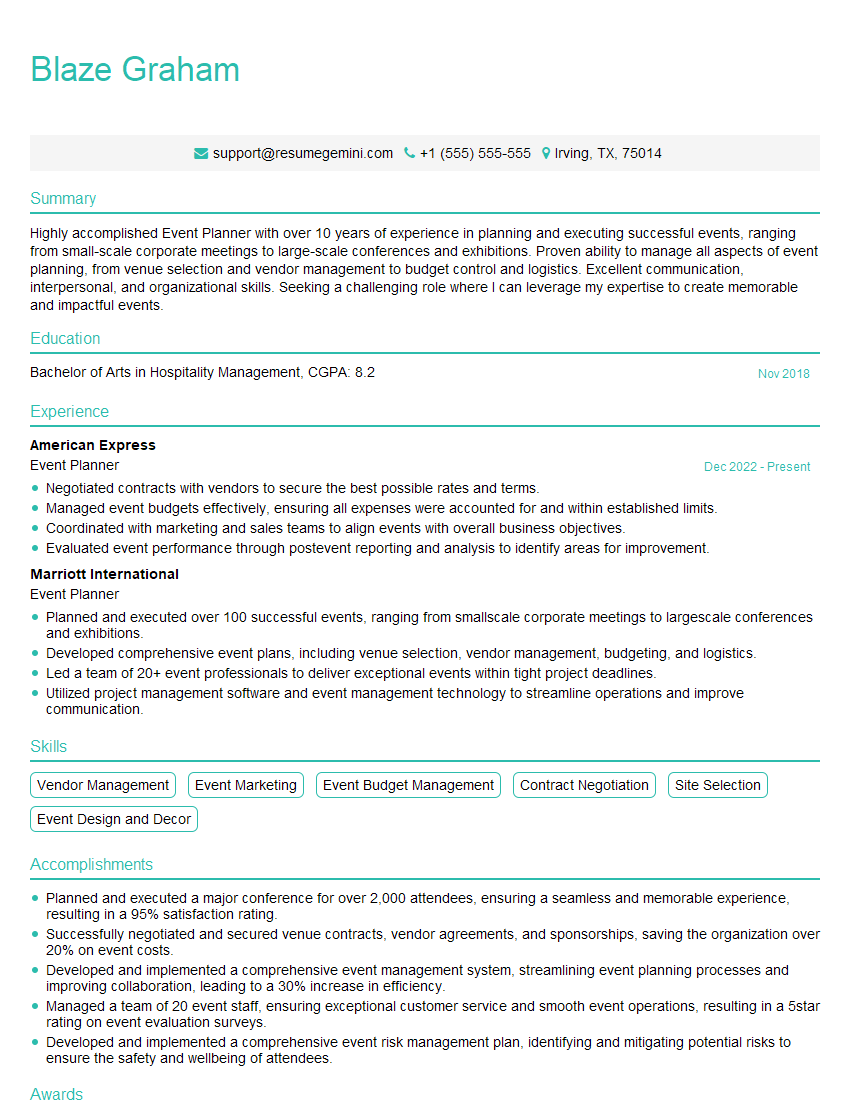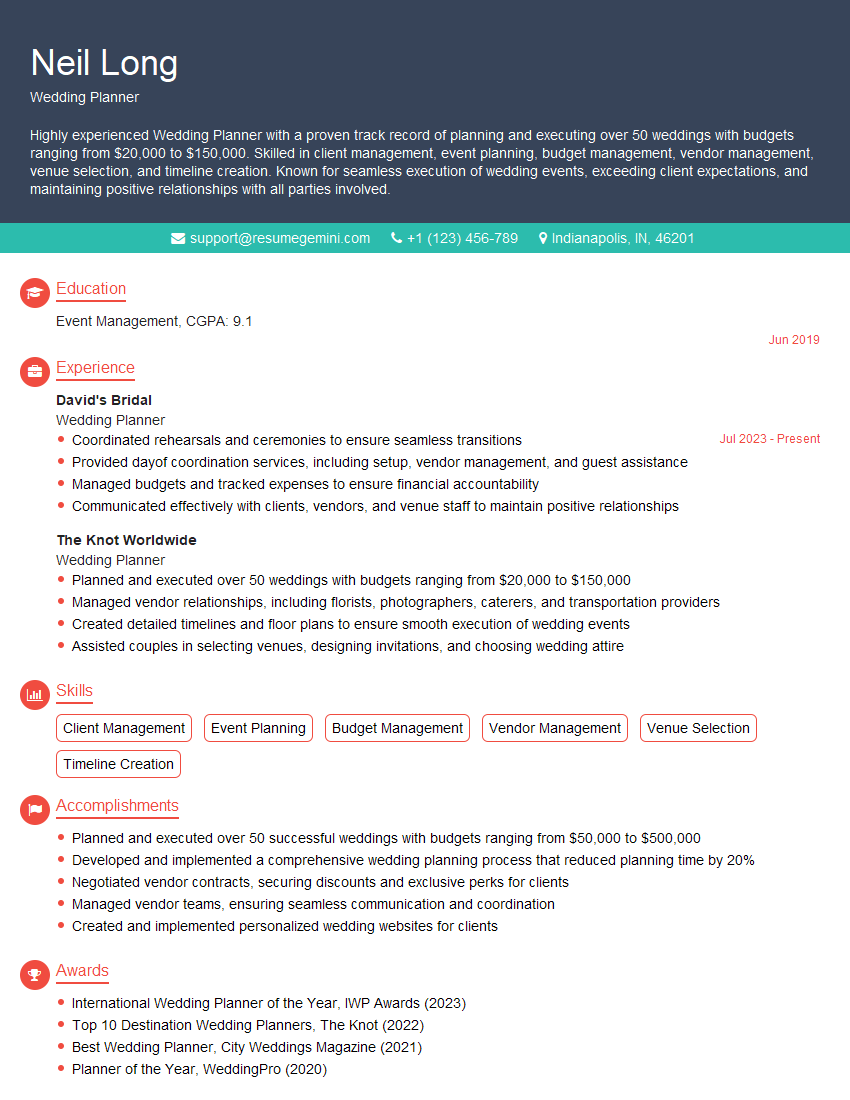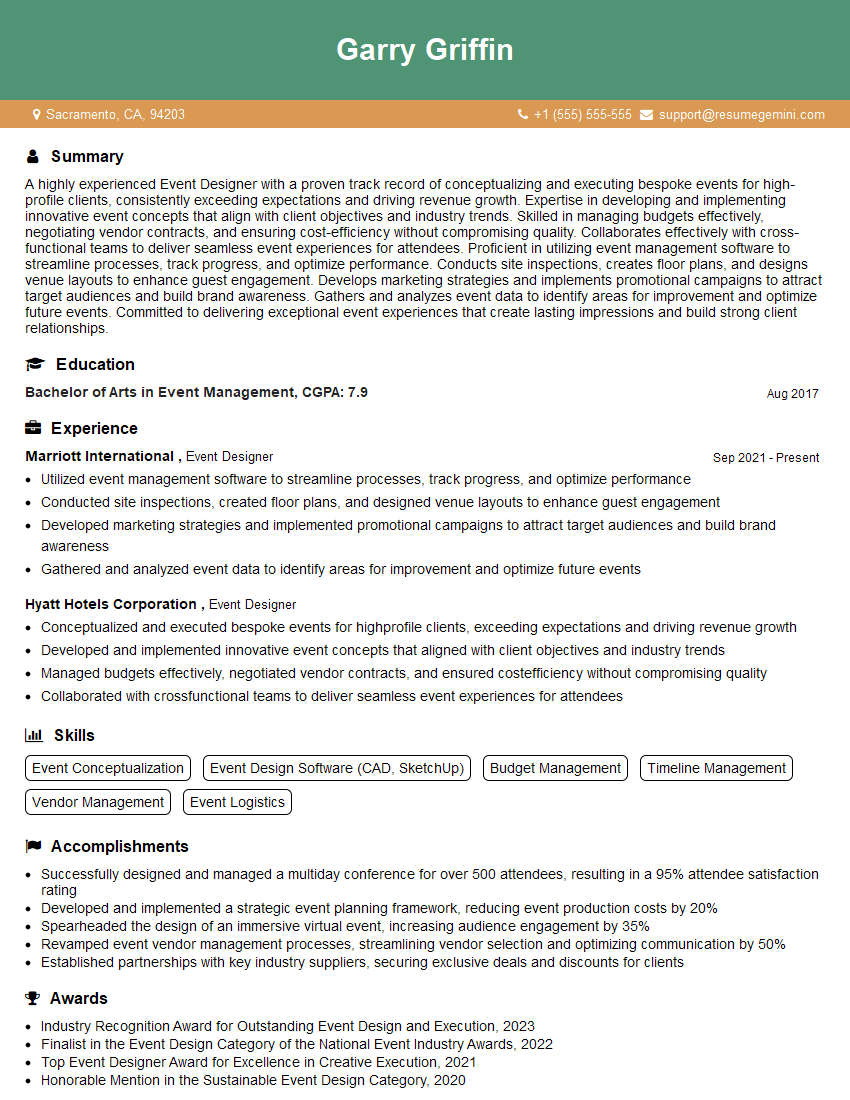The right preparation can turn an interview into an opportunity to showcase your expertise. This guide to Event Planning and Showcases interview questions is your ultimate resource, providing key insights and tips to help you ace your responses and stand out as a top candidate.
Questions Asked in Event Planning and Showcases Interview
Q 1. Describe your experience in managing event budgets.
Managing event budgets requires a meticulous approach, blending financial acumen with creative problem-solving. My process begins with a comprehensive budget template, outlining all anticipated costs – from venue rental and catering to marketing and staffing. I work closely with clients to establish realistic budget parameters, prioritizing essential elements while identifying areas for potential cost savings. This involves exploring various vendor options, comparing quotes, and negotiating favorable rates. For example, in planning a recent corporate retreat, we explored alternative catering options, opting for a buffet-style service instead of a plated dinner, which resulted in a 15% reduction in catering costs without compromising quality. Throughout the event lifecycle, I meticulously track expenses against the budget, using spreadsheet software to monitor progress and identify any potential overruns. Regular budget reviews ensure transparency and allow for timely adjustments, preventing financial surprises.
I also employ a contingency fund, typically allocating 5-10% of the total budget to address unforeseen expenses. This could range from emergency repairs to unexpected talent fees. This proactive measure protects the event’s financial health and mitigates the risk of exceeding the allocated budget.
Q 2. How do you handle unexpected issues during an event?
Unexpected issues are inevitable in event planning. My approach focuses on proactive risk assessment and preparation, but also on reactive problem-solving. The first step is to stay calm and assess the situation. I delegate tasks to my team to address immediate needs, ensuring clear communication and collaboration. For example, if a speaker cancels last minute, I immediately explore alternative speakers, or adjust the schedule to fill the gap. This may involve calling upon my network of contacts in the industry or quickly researching and vetting alternative options.
I always have a detailed contingency plan, a sort of ‘what-if’ scenario list, to anticipate potential problems and have solutions ready. This plan outlines procedures for handling technical glitches, weather disruptions, or even medical emergencies. Transparency with clients is crucial. I keep them informed of the situation and the steps being taken to resolve it, maintaining clear communication throughout the process. Following the event, I conduct a post-event review to identify areas for improvement and to refine my contingency plans for future events.
Q 3. What event planning software are you proficient in?
I am proficient in several event planning software applications, including Cvent, Eventbrite, and Social Tables. Cvent is my go-to platform for large-scale events, offering robust features for registration, marketing, and vendor management. Eventbrite is excellent for smaller events and ticket sales, streamlining the registration process. Social Tables is invaluable for floor plan design and seating arrangements, allowing for interactive visualization and optimization. I also leverage project management tools like Asana and Trello for task assignment, collaboration and efficient workflow management.
My expertise extends beyond basic functionalities; I leverage advanced features like custom reporting in Cvent to analyze attendance data and measure event ROI. In Eventbrite, I utilize features to customize ticket types and manage waitlists, maximizing attendance. Social Tables helps optimize seating arrangements considering client preferences, accessibility needs, and networking opportunities.
Q 4. Explain your process for selecting vendors and negotiating contracts.
Selecting vendors and negotiating contracts is a critical aspect of event planning, requiring a thorough and strategic approach. I begin by identifying potential vendors based on their reputation, experience, and alignment with the event’s goals. This often includes requesting referrals, reading online reviews and checking their portfolios.
Next, I request detailed proposals outlining services, pricing, and contract terms. I carefully compare proposals, considering factors beyond price, such as vendor responsiveness, professionalism, and their understanding of the event’s objectives. Then comes the negotiation phase, where I clearly articulate the event’s needs and seek mutually beneficial terms. This involves skillful communication to achieve optimal pricing while ensuring quality service. For example, for a recent conference, we negotiated a better rate with the AV provider by committing to a multi-year contract. Finally, once a mutually agreeable contract is reached, I review it carefully before signing, ensuring all details are accurate and protect the event’s interests. All contracts are reviewed by legal counsel before finalization.
Q 5. How do you ensure event compliance with relevant regulations?
Ensuring event compliance is paramount. My approach starts with a thorough understanding of all relevant regulations, including local laws, fire codes, health and safety standards, and any specific requirements for the event venue. I build these regulations into the event planning process from the very beginning.
This includes obtaining necessary permits and licenses well in advance. For example, for outdoor events, I ensure we have the correct permits for noise levels, crowd control, and any potential impact on the environment. I work closely with the venue management to understand and meet their specific requirements and any local regulations. I also integrate accessibility features for attendees with disabilities, ensuring compliance with ADA guidelines. Regular checks and communication with relevant authorities ensure our continued compliance and proactive mitigation of any potential issues.
Q 6. Describe your experience with event risk assessment and mitigation.
Event risk assessment is a proactive measure to identify and mitigate potential problems. I use a structured approach, starting with brainstorming potential risks – everything from weather disruptions and technical failures to security concerns and medical emergencies. This often involves creating a risk register, documenting potential hazards, their likelihood, and their potential impact.
For each identified risk, I develop a mitigation strategy, outlining the steps to minimize the risk and develop contingency plans. This might involve purchasing event insurance, securing backup equipment, or establishing clear communication protocols with emergency services. For instance, for an outdoor concert, we developed a detailed weather contingency plan, including alternative indoor venues and a clear communication strategy for attendees in case of inclement weather. Regular risk reviews, especially during the lead-up to the event, allow for refinement and adaptation as needed. The goal is to create a safe and secure environment for all participants.
Q 7. How do you manage attendee registration and communication?
Managing attendee registration and communication is vital for a smooth event. I use event registration platforms, such as Cvent or Eventbrite, to streamline the process. These platforms allow for automated email communications, customized registration forms, and efficient tracking of attendees. I develop clear and concise communication strategies, using a mix of email, SMS messages, and social media to keep attendees informed throughout the event lifecycle – from initial registration to post-event follow-ups.
For example, I send regular email updates providing information on event logistics, venue details, and speaker information. Automated reminders and confirmations minimize the chance of missed attendance. Post-event, I send thank-you messages and surveys to gather feedback, ensuring continuous improvement. Managing attendee lists and using communication tools efficiently helps ensure smooth operation and positive attendee experience. I always prioritize data privacy and comply with all relevant data protection regulations.
Q 8. What strategies do you employ for event marketing and promotion?
Event marketing and promotion is crucial for attracting the right audience. My strategy is multifaceted, leveraging both digital and traditional methods. It starts with clearly defining the target audience and the event’s unique selling proposition (USP). Then, I build a comprehensive marketing plan.
- Digital Marketing: This includes creating engaging social media campaigns across platforms like Instagram, Facebook, and LinkedIn, tailored to each platform’s audience. I utilize targeted advertising to reach specific demographics and interests. Email marketing plays a key role, with segmented lists ensuring personalized messaging. Website optimization and SEO are essential for organic reach. For example, for a tech conference, I’d leverage LinkedIn heavily and use relevant hashtags to increase visibility.
- Traditional Marketing: This might involve print advertising in relevant publications, collaborating with influencers or media outlets, and potentially securing partnerships with organizations whose audience aligns with the event’s attendees. Press releases announcing the event and highlighting key speakers are also crucial. For a local art fair, partnering with community newspapers and radio stations would be highly effective.
- Public Relations (PR): I actively cultivate relationships with journalists and bloggers to secure media coverage. This could involve press kits and exclusive interviews. Positive press builds credibility and attracts attendees organically.
- Early Bird Discounts and Incentives: Offering early registration discounts incentivizes early sign-ups, helping with budgeting and providing early indications of interest.
Continuous monitoring and analysis of marketing efforts are vital, allowing for adjustments based on performance data. A/B testing different approaches helps refine the strategy over time.
Q 9. How do you measure the success of an event?
Measuring event success goes beyond simple attendance figures. I employ a balanced scorecard approach, looking at various Key Performance Indicators (KPIs). These KPIs can be grouped into several categories:
- Attendance & Reach: Actual attendance vs. target attendance; website traffic; social media engagement (likes, shares, comments); media mentions; reach via various marketing channels.
- Engagement & Satisfaction: Pre- and post-event surveys gauging attendee satisfaction; session feedback; social media sentiment analysis; networking opportunities utilized; sponsor satisfaction.
- Financial Performance: Return on Investment (ROI); revenue generated (including sponsorship deals); cost analysis; budget adherence.
- Achievement of Objectives: Did the event accomplish its pre-defined goals, whether it was raising awareness, launching a product, or driving sales? For example, if the goal was to secure new business partnerships, we would measure the number of successful partnerships formed as a result.
Data from various sources is analyzed to provide a holistic view of success. This data-driven approach guides future event planning and continuous improvement.
Q 10. Explain your experience with post-event analysis and reporting.
Post-event analysis and reporting is critical for learning and improvement. My process involves several key steps:
- Data Collection: Gathering data from various sources, including registration forms, surveys, social media, financial records, and sponsor feedback forms.
- Data Analysis: Analyzing the collected data to identify trends, successes, and areas for improvement. For instance, if post-event surveys reveal low satisfaction with catering, that’s a crucial area to address in future events.
- Report Generation: Creating a comprehensive report summarizing key findings, including both quantitative and qualitative data. This report typically includes charts and graphs to visually represent the data.
- Actionable Insights: Translating findings into specific, actionable recommendations for future events. This might include changes to the event’s format, marketing strategy, or logistics.
- Dissemination & Follow-up: Sharing the report with stakeholders and outlining plans to implement the recommendations. A follow-up meeting is often helpful to discuss the findings and actionable plans in more detail.
For example, if a specific speaker’s session had low attendance, we might review their topic and marketing strategy for future events to see if adjustments are needed.
Q 11. Describe your experience with virtual or hybrid event planning.
I have significant experience with virtual and hybrid event planning. The key difference lies in leveraging technology to create engaging experiences for remote and/or in-person attendees. Virtual events require meticulous attention to technical details and audience engagement strategies.
- Platform Selection: Choosing the right virtual event platform is crucial and depends on the size and type of event. This involves considering features like live streaming capabilities, interactive elements, networking tools, and attendee management.
- Engagement Strategies: Maintaining attendee engagement in a virtual setting is paramount. Strategies include interactive polls, Q&A sessions, breakout rooms, gamification, and virtual networking opportunities.
- Technical Support: Providing robust technical support throughout the event is essential, especially for virtual events. This involves addressing technical issues promptly and ensuring a smooth attendee experience.
- Hybrid Events: Balancing the needs of in-person and virtual attendees requires careful planning. This involves synchronizing content, ensuring seamless transitions between formats, and providing a consistent experience for everyone.
For a hybrid conference, we might use a platform with live streaming for online attendees, while simultaneously providing high-quality audio-visual for the in-person audience. Pre-recorded sessions can be incorporated to allow for asynchronous viewing.
Q 12. How do you manage event logistics, including transportation and accommodation?
Managing event logistics is a complex undertaking that requires meticulous planning and attention to detail. My approach involves a structured process:
- Venue Selection: Selecting a suitable venue based on factors like capacity, accessibility, location, and amenities. For large events, this often involves site visits and negotiations with venue management.
- Transportation: Arranging transportation for attendees, speakers, and staff. This might involve shuttle services, airport transfers, or public transportation recommendations.
- Accommodation: Securing accommodation for attendees and speakers, often negotiating group rates with hotels or other accommodation providers. This includes managing room bookings and confirming reservations.
- Catering: Coordinating with catering providers to arrange food and beverage services, ensuring dietary requirements and preferences are met.
- On-site Management: Providing on-site management during the event, ensuring smooth operations and addressing any logistical issues that might arise. This involves a dedicated team responsible for registration, signage, and on-site support.
For a multi-day conference, I would create a detailed schedule outlining all logistical arrangements including arrival times, transportation options, and meal timings to minimize any potential disruption or confusion.
Q 13. What is your experience with event security planning?
Event security planning is non-negotiable, particularly for large-scale events. My approach involves a risk assessment and a layered security strategy.
- Risk Assessment: Identifying potential security risks specific to the event, such as crowd control issues, terrorism threats, or theft. This involves considering the event’s location, size, and anticipated attendees.
- Security Personnel: Hiring and deploying trained security personnel to manage access control, monitor attendee behaviour, and respond to any incidents. This includes clear communication channels with local law enforcement.
- Emergency Preparedness: Developing an emergency plan that outlines procedures for handling various scenarios, such as medical emergencies, evacuations, or security breaches. Regular drills ensure preparedness.
- Technology: Utilizing technology to enhance security, such as CCTV cameras, metal detectors, and access control systems.
- Communication Plan: Establishing clear communication channels between security personnel, event staff, and attendees to ensure swift and effective responses to any situation.
For a large music festival, a comprehensive security plan might include perimeter fencing, multiple security checkpoints, and collaboration with local emergency services.
Q 14. How do you handle event sponsorships and partnerships?
Event sponsorships and partnerships are vital for securing funding and expanding reach. My approach focuses on building mutually beneficial relationships.
- Identifying Potential Sponsors: Identifying organizations whose products or services align with the event’s target audience and objectives. This involves researching potential sponsors and understanding their marketing goals.
- Developing Sponsorship Packages: Crafting tailored sponsorship packages that offer a variety of benefits to sponsors, such as branding opportunities, speaking slots, or access to attendees.
- Negotiation and Contract Management: Negotiating terms with sponsors and ensuring all agreements are documented in contracts. This includes clearly outlining deliverables and expectations for both parties.
- Relationship Management: Building and maintaining strong relationships with sponsors throughout the event lifecycle. This ensures continued engagement and potential future collaborations.
- Delivering on Promises: Meticulously fulfilling all promises outlined in sponsorship agreements, delivering on branding opportunities, and providing sponsors with regular updates and reports.
For a tech conference, I’d approach tech companies offering them various sponsorship tiers based on their budget and desired exposure, perhaps including branding on event materials, speaking opportunities, and dedicated exhibition booths.
Q 15. Describe your experience with event setup and teardown.
Event setup and teardown are critical for a successful event. My experience encompasses overseeing everything from initial venue assessment and logistics coordination to the final clean-up and equipment return. This includes managing vendors, scheduling crew members, and ensuring all elements, from staging and lighting to catering and décor, are flawlessly executed both before and after the event.
For example, in a recent corporate conference, I managed a team of 15 to transform a large convention hall from a blank space into a fully functional event venue in under 12 hours. This involved precise staging of exhibition booths, meticulous cable management for A/V equipment, and ensuring all signage was correctly placed. Teardown was equally organized, prioritizing the safe dismantling of structures, efficient packing, and the prompt return of all rented equipment.
I utilize detailed checklists and Gantt charts to manage the setup and teardown process, ensuring that all tasks are completed on schedule and within budget. This methodical approach minimizes stress and maximizes efficiency, ensuring a smooth transition for attendees and a quick return to the venue’s normal state.
Career Expert Tips:
- Ace those interviews! Prepare effectively by reviewing the Top 50 Most Common Interview Questions on ResumeGemini.
- Navigate your job search with confidence! Explore a wide range of Career Tips on ResumeGemini. Learn about common challenges and recommendations to overcome them.
- Craft the perfect resume! Master the Art of Resume Writing with ResumeGemini’s guide. Showcase your unique qualifications and achievements effectively.
- Don’t miss out on holiday savings! Build your dream resume with ResumeGemini’s ATS optimized templates.
Q 16. What is your approach to creating an engaging event experience?
Creating an engaging event experience hinges on understanding your target audience and tailoring the event to meet their needs and expectations. My approach involves a multi-faceted strategy focusing on:
- Immersive Environments: Designing spaces that are visually stimulating, comfortable, and encourage interaction. This might involve unique theming, interactive displays, or carefully curated décor.
- Compelling Content: Providing relevant, high-quality content that is engaging and thought-provoking. This could include keynote speakers, interactive workshops, or dynamic presentations.
- Networking Opportunities: Facilitating interactions between attendees through structured networking events, icebreakers, or social spaces.
- Exceptional Service: Ensuring that all attendees feel welcomed, valued, and supported throughout the event. This includes prompt assistance, clear communication, and attentiveness to detail.
For instance, at a recent product launch, we integrated interactive gaming elements into the event flow, allowing attendees to engage directly with the product and compete for prizes. This created a memorable and highly interactive experience that generated significant buzz and positive feedback.
Q 17. How do you manage volunteer teams or event staff?
Managing volunteer teams and event staff requires strong communication, clear delegation, and effective leadership. I begin by creating a detailed job description for each role, providing clear expectations and responsibilities. Before the event, I conduct thorough training sessions, covering all essential procedures and protocols. During the event, I maintain open communication channels, ensuring everyone is informed and knows where to go for support. I also foster a positive and collaborative team environment, recognizing and appreciating their contributions.
For example, I employed a tiered volunteer system for a large charity gala. Each tier had a designated lead who reported directly to me, ensuring efficient task delegation and effective oversight. This system, along with clearly defined roles and responsibilities, ensured smooth operations and maximized volunteer satisfaction.
Regular check-ins, clear communication, and appreciation are key to ensuring a motivated and efficient team. Utilizing a project management software allows for task assignment, progress tracking and real-time communication.
Q 18. How do you handle difficult attendees or stakeholders?
Handling difficult attendees or stakeholders requires diplomacy, empathy, and a problem-solving approach. I start by actively listening to their concerns, showing respect and understanding. I then attempt to identify the root cause of their dissatisfaction and work collaboratively to find a mutually acceptable solution. If necessary, I escalate the issue to higher management or security personnel, ensuring the safety and well-being of all attendees. Maintaining a calm and professional demeanor is crucial throughout the process.
For instance, I once had a vendor who became upset over a logistical issue. By actively listening to their concerns, confirming the validity of the problem, and offering a compromise solution, I was able to de-escalate the situation and ensure the vendor continued to participate. Proactive communication and careful planning often prevent such situations from arising.
Q 19. What is your experience with event technology and AV equipment?
I possess extensive experience with a wide range of event technology and AV equipment. This includes working with lighting systems, sound systems, projection equipment, video conferencing platforms, registration software, and event apps. I am proficient in troubleshooting technical issues, ensuring seamless integration of all technologies, and optimizing their use to enhance the event experience.
I have experience using various software programs like those mentioned above, and I am adept at utilizing different platforms for live streaming, virtual events, and hybrid events. I always ensure that adequate backups are in place to avoid any technical malfunctions and that personnel are on-hand to troubleshoot any issues.
For a recent virtual conference, I oversaw the setup and execution of a complex multi-camera live-stream, incorporating interactive elements and real-time audience participation. This required meticulous planning, close collaboration with the technical team, and rigorous testing to ensure a flawless broadcast.
Q 20. Describe your experience with creating event timelines and schedules.
Creating event timelines and schedules is crucial for successful event planning. My approach involves breaking down the entire event into smaller, manageable tasks. I then assign deadlines for each task, considering dependencies and potential bottlenecks. I utilize project management software to track progress, manage resources, and ensure tasks are completed on schedule. These timelines are then shared with all relevant stakeholders, ensuring everyone is informed and aligned.
I use Gantt charts extensively, clearly visualizing task dependencies and deadlines. This allows for proactive identification and mitigation of potential conflicts. Regular review and updates are crucial to adapt to unforeseen circumstances. Using a collaborative software allows for everyone to see the schedule and make suggestions.
For example, for a large-scale music festival, I developed a comprehensive timeline encompassing months of pre-event planning, detailed day-of-event schedules, and post-event wrap-up procedures. This ensured seamless coordination across various teams, including stage management, security, catering, and logistics.
Q 21. How do you prioritize tasks and manage time effectively during event planning?
Prioritizing tasks and managing time effectively during event planning requires a strategic approach. I utilize project management methodologies, such as the Eisenhower Matrix (urgent/important), to categorize tasks based on their priority and urgency. I then allocate time accordingly, focusing on high-impact tasks first. Regularly reviewing and adjusting the schedule is crucial to accommodate changing priorities or unforeseen circumstances.
Timeboxing is another key technique I employ, allocating specific time blocks for particular tasks. This encourages focus and prevents task creep. I also use time-blocking to schedule buffer time into my schedule to account for unexpected delays or issues. Regular check-ins and communication with the team helps maintain the schedule and prevent delays. Using project management software assists in prioritizing tasks, allocating time and tracking progress, creating accountability.
Effective time management isn’t just about completing tasks; it’s about minimizing stress and maximizing productivity. Proactive planning and realistic expectations are essential for ensuring success.
Q 22. How do you ensure the accessibility of your events for all attendees?
Ensuring accessibility is paramount. It’s not just about compliance; it’s about creating an inclusive experience for every attendee. My approach is multifaceted and begins long before the event date.
- Pre-Planning: I meticulously survey the venue, identifying potential accessibility issues like steps, narrow doorways, or lack of accessible restrooms. I then work with the venue to implement solutions or find alternative, accessible locations. This includes confirming the availability of ramps, elevators, and appropriately sized accessible seating.
- Registration & Communication: The registration process should proactively inquire about accessibility needs. This information allows for personalized arrangements, such as providing wheelchair-accessible seating, sign language interpreters, or alternative formats for printed materials (e.g., large print, Braille).
- Event Design: Wayfinding is critical. Clear signage, including Braille and large print, must be strategically placed throughout the venue. I consider audio description for visual presentations and closed captioning for any video content. Event layout should ensure ample space for wheelchairs and other mobility devices to maneuver easily.
- Staff Training: I ensure that all event staff receive training on how to assist attendees with disabilities. This includes understanding the nuances of various disabilities and providing appropriate support.
- Technology: Employing accessible technologies, such as screen readers compatible websites and apps, ensures inclusivity extends to all communication channels.
For example, during a large conference I organized, we partnered with a local accessibility organization to conduct a pre-event audit. This resulted in the addition of accessible parking spaces, tactile paving for the visually impaired, and the provision of assistive listening devices for those with hearing impairments. The feedback we received was overwhelmingly positive, showcasing the impact of a truly inclusive event.
Q 23. Describe your experience working with different event styles and formats.
My experience spans a wide range of event styles and formats, from intimate corporate workshops to large-scale public festivals. I’ve successfully managed:
- Conferences & Conventions: These events often involve multiple speakers, workshops, and networking opportunities, requiring meticulous scheduling, logistics, and speaker coordination.
- Product Launches & Showcases: These events are highly focused on creating an impactful experience to promote a specific product or service, often involving immersive displays and engaging presentations.
- Corporate Events: From team-building retreats to annual shareholder meetings, these events require a strong understanding of the company culture and objectives.
- Weddings & Private Parties: These events require a personal touch and a deep understanding of the client’s vision and needs. I thrive in translating their dreams into reality.
- Fundraising Galas & Charity Events: These events demand a blend of creativity, logistical precision, and sensitivity, striving to maximize fundraising and engagement.
Each format requires a unique approach. For example, a product launch demands a visually stunning presentation and engaging technology, while a corporate retreat emphasizes team building activities and a relaxed atmosphere. I adapt my strategy based on the event’s specific goals and the target audience.
Q 24. What is your approach to creating a positive and collaborative work environment?
Building a positive and collaborative work environment is crucial for successful event planning. It’s not just about pleasantries; it’s about fostering trust, open communication, and mutual respect. My approach revolves around:
- Clear Communication: I emphasize consistent and transparent communication among team members. This includes regular meetings, project updates, and open channels for feedback.
- Delegation & Empowerment: I delegate tasks effectively based on individual strengths and provide team members with the autonomy to manage their responsibilities. This fosters ownership and accountability.
- Recognition & Appreciation: I actively recognize and appreciate individual and team accomplishments. Acknowledging hard work boosts morale and strengthens team cohesion.
- Conflict Resolution: I create a safe space for constructive conflict resolution, addressing disagreements professionally and fairly. This ensures healthy debate and creative problem-solving.
- Team Building: I incorporate team-building activities, both formal and informal, to foster camaraderie and strengthen relationships.
For instance, during a particularly challenging event, I implemented a daily ‘huddle’ where the team could share their concerns and brainstorm solutions. This open forum reduced stress and improved our collaborative problem-solving skills.
Q 25. How do you adapt to changing circumstances and unexpected challenges?
Adaptability is essential in event planning. Unexpected challenges are inevitable. My approach involves:
- Contingency Planning: I develop comprehensive contingency plans for various scenarios, from unexpected weather to speaker cancellations. This proactive approach minimizes disruption when problems arise.
- Risk Assessment: I conduct thorough risk assessments identifying potential problems and developing mitigation strategies. This helps prioritize efforts and resources effectively.
- Problem-Solving Skills: I maintain a calm and methodical approach when dealing with unexpected issues, focusing on finding practical solutions quickly and efficiently.
- Communication: Maintaining open communication with all stakeholders—clients, vendors, and the team—is key to navigating unexpected issues. Transparency prevents rumors and facilitates swift responses.
- Resourcefulness: I leverage my network and resourcefulness to find alternative solutions when necessary. This might involve finding a replacement vendor or adjusting the event schedule.
For example, during a large outdoor concert, an unexpected thunderstorm threatened to disrupt the event. Thanks to our contingency plan, we quickly relocated the event to an indoor venue, minimizing disruption and ensuring a successful outcome.
Q 26. Describe a time you had to solve a complex problem during an event.
During a high-profile product launch, our primary presenter fell ill just hours before the event. This was a complex problem requiring a rapid and creative solution.
My immediate actions were:
- Assess the situation: I quickly gathered my team to determine the severity of the issue and its potential impact on the event.
- Explore options: We considered several solutions, including postponing the event, finding a replacement speaker, or adjusting the presentation format to rely more heavily on pre-recorded content.
- Develop a solution: We opted to leverage pre-recorded video segments and have a member of the technical team deliver a shorter, improvised presentation based on the prepared materials.
- Implement the solution: We quickly re-organized the event schedule and informed the attendees of the slight change of plans.
The team’s collaborative efforts and swift actions ensured a successful event, minimizing disruption and showcasing our adaptability under pressure. While it wasn’t ideal, we turned a potential disaster into a demonstration of our ability to solve complex problems in real-time.
Q 27. What is your approach to sustainability in event planning?
Sustainability is more than a trend; it’s a responsibility. My approach to sustainable event planning integrates environmental consciousness throughout the entire process:
- Venue Selection: I prioritize venues with established sustainability practices, such as energy-efficient systems and waste reduction programs.
- Catering & Food Sourcing: I favor locally sourced, seasonal food, reducing transportation emissions and supporting local businesses. I also minimize food waste by carefully estimating quantities and planning for leftovers.
- Waste Management: I implement comprehensive waste reduction and recycling programs, including clearly marked bins and composting options. I minimize single-use plastics and opt for reusable alternatives whenever possible.
- Technology: I utilize digital invitations and registration systems, reducing paper consumption. I also explore virtual event elements to minimize travel-related emissions where feasible.
- Transportation: I encourage attendees to utilize public transportation, cycling, or carpooling, and I select venues with easy access to public transport.
For a recent conference, we partnered with a local composting company and implemented a robust recycling program, resulting in a significant reduction in landfill waste. These actions not only contributed to environmental protection but also enhanced the event’s image and appeal to environmentally conscious attendees.
Q 28. How do you stay up-to-date with industry trends and best practices?
Staying current in the event planning industry is vital. My strategies include:
- Industry Publications & Websites: I regularly read industry publications, blogs, and websites to stay informed about new trends, technologies, and best practices.
- Professional Development: I actively participate in conferences, workshops, and online courses to enhance my skills and knowledge. This includes pursuing certifications relevant to the field.
- Networking: I maintain strong professional connections within the industry through networking events and online communities. This provides access to insights, trends, and solutions.
- Client Feedback: I actively solicit and analyze feedback from clients and attendees to identify areas for improvement and gain insights into evolving expectations.
- Technological Advancements: I monitor emerging technologies like virtual reality (VR) and augmented reality (AR) for potential applications in event planning and interactive experiences.
Attending industry events, for example, not only updates my knowledge but also provides invaluable opportunities to network with leading event professionals and learn from their experiences. These strategies ensure that I’m always prepared to deliver cutting-edge event experiences.
Key Topics to Learn for Event Planning and Showcases Interview
- Budget Management & Sponsorship Acquisition: Understanding budgeting principles, forecasting expenses, securing sponsorships, and managing financial resources effectively. Practical application includes creating realistic budgets and negotiating sponsorship deals.
- Venue Selection & Logistics: Criteria for selecting appropriate venues based on event type and audience size. This includes coordinating logistics like transportation, catering, and accessibility. Problem-solving might involve finding alternative venues if initial choices are unavailable.
- Event Marketing & Promotion: Developing effective marketing strategies, utilizing various channels (digital and traditional), measuring campaign success, and adapting approaches as needed. Practical applications include creating marketing plans and analyzing campaign data.
- Risk Management & Contingency Planning: Identifying potential risks and developing contingency plans to address them. This includes handling unexpected situations and ensuring event safety and smooth execution. Problem-solving involves proactive risk assessment and creating detailed emergency protocols.
- Vendor Management & Communication: Selecting and managing vendors, negotiating contracts, maintaining effective communication, and ensuring quality of services. Practical applications include vendor selection and managing contracts.
- Post-Event Analysis & Reporting: Evaluating event success through data analysis, identifying areas for improvement, and creating comprehensive reports for stakeholders. This includes using metrics to demonstrate ROI and future planning.
- Technology Integration: Utilizing event management software, registration platforms, and other technologies to streamline processes and enhance the attendee experience. Practical applications include selecting and implementing event technology tools.
Next Steps
Mastering event planning and showcases significantly boosts your career prospects, opening doors to exciting roles in various industries. A strong resume is crucial for landing your dream job. Creating an ATS-friendly resume—one that Applicant Tracking Systems can easily read—is essential for getting your application noticed. To help you build a compelling and effective resume, we recommend using ResumeGemini. ResumeGemini provides a user-friendly platform to craft professional resumes tailored to your specific experience. Examples of resumes tailored to Event Planning and Showcases are available to help you get started. Take the next step towards your ideal career by building a standout resume today!
Explore more articles
Users Rating of Our Blogs
Share Your Experience
We value your feedback! Please rate our content and share your thoughts (optional).
What Readers Say About Our Blog
Hello,
We found issues with your domain’s email setup that may be sending your messages to spam or blocking them completely. InboxShield Mini shows you how to fix it in minutes — no tech skills required.
Scan your domain now for details: https://inboxshield-mini.com/
— Adam @ InboxShield Mini
Reply STOP to unsubscribe
Hi, are you owner of interviewgemini.com? What if I told you I could help you find extra time in your schedule, reconnect with leads you didn’t even realize you missed, and bring in more “I want to work with you” conversations, without increasing your ad spend or hiring a full-time employee?
All with a flexible, budget-friendly service that could easily pay for itself. Sounds good?
Would it be nice to jump on a quick 10-minute call so I can show you exactly how we make this work?
Best,
Hapei
Marketing Director
Hey, I know you’re the owner of interviewgemini.com. I’ll be quick.
Fundraising for your business is tough and time-consuming. We make it easier by guaranteeing two private investor meetings each month, for six months. No demos, no pitch events – just direct introductions to active investors matched to your startup.
If youR17;re raising, this could help you build real momentum. Want me to send more info?
Hi, I represent an SEO company that specialises in getting you AI citations and higher rankings on Google. I’d like to offer you a 100% free SEO audit for your website. Would you be interested?
Hi, I represent an SEO company that specialises in getting you AI citations and higher rankings on Google. I’d like to offer you a 100% free SEO audit for your website. Would you be interested?
good
